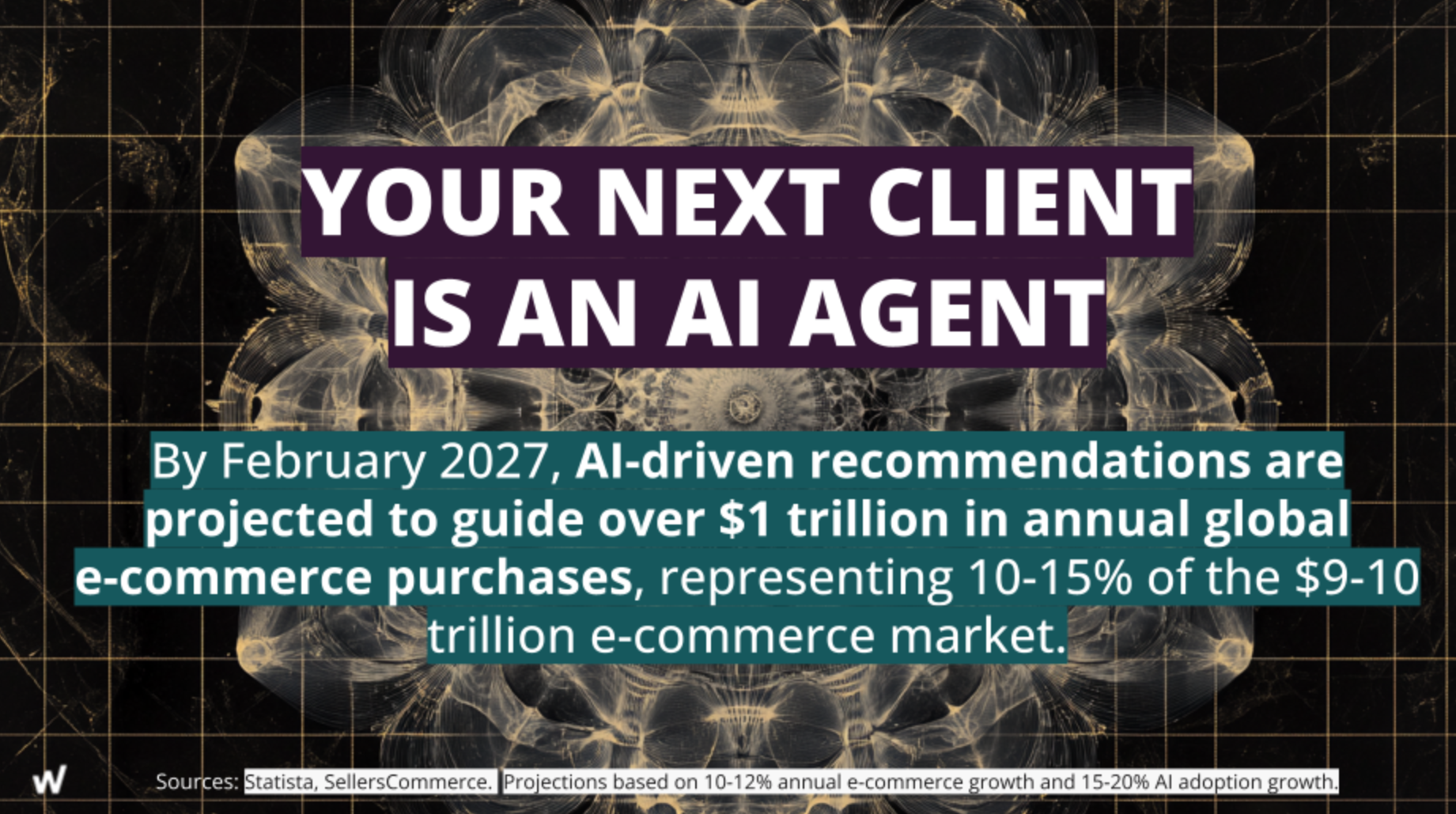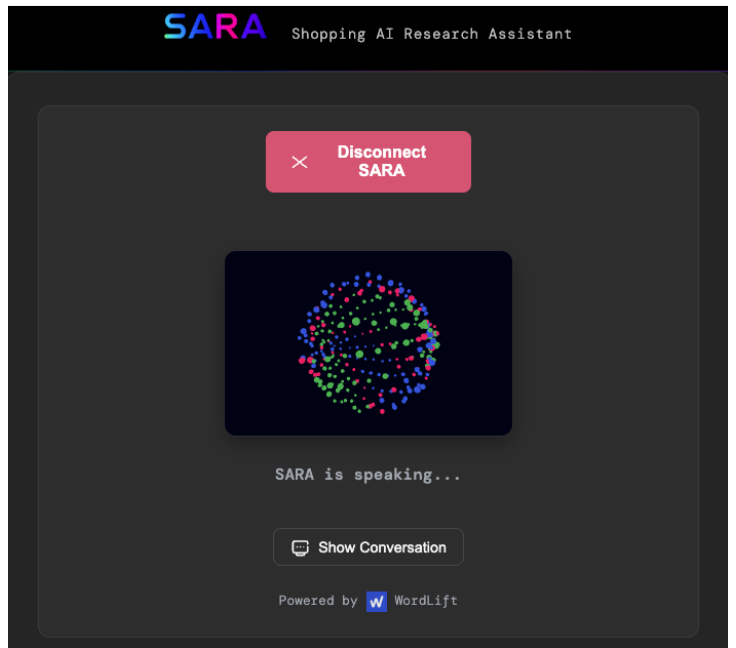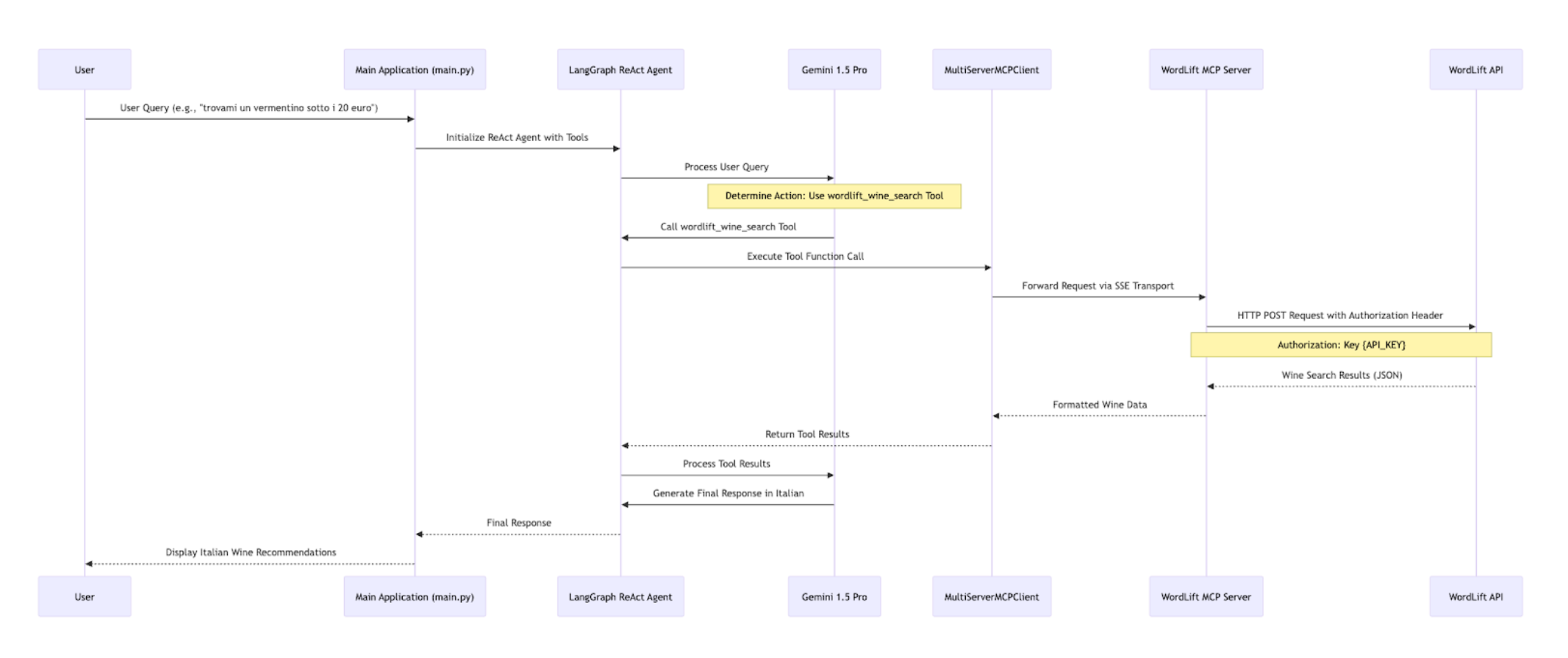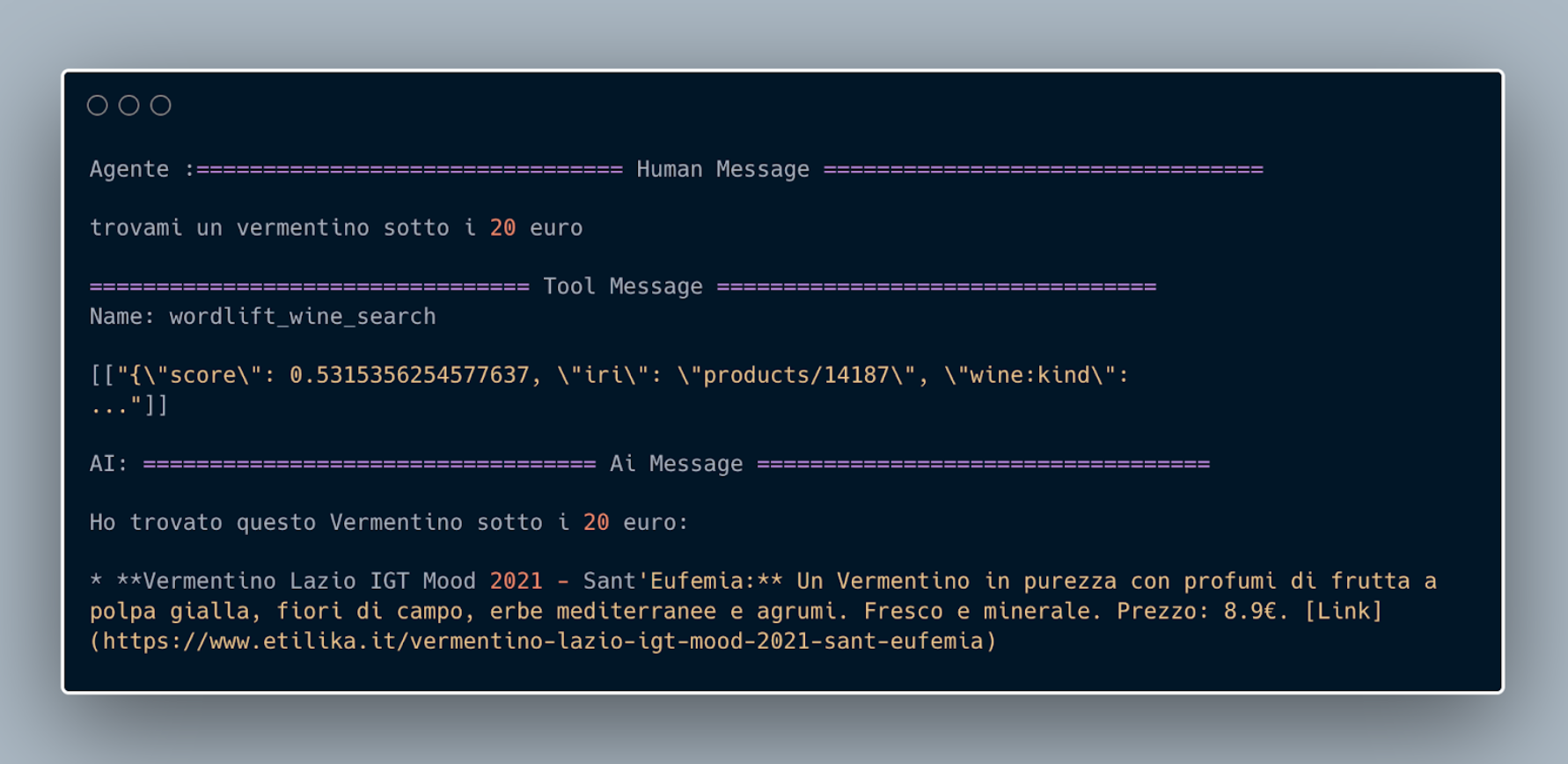Your Next Client is an AI Agent
“From the first webpage we built for humans to the first Model Context Protocol we built for an AI agent. We’re entering a new era where your website’s most important visitor isn’t a person, it’s an agent.”
— @cyberandy
By 2027, AI-driven recommendations are projected to guide over $1 trillion in annual global e-commerce purchases (Statista, McKinsey), representing 10–15% of the anticipated $9–10 trillion e-commerce market (GlobalData).
This transformation is already underway — over 35% of Amazon’s sales are attributed to AI-powered product recommendations (McKinsey, 2023), and voice commerce is expected to reach $150–420 billion globally by 2030 (Statista, Juniper Research).
MCP is inevitable — just like HTML was in the ’90s. https://t.co/SLUrD4Xhgf
— Andrea Volpini (@cyberandy) March 31, 2025


At WordLift Labs, we’ve long been helping clients prepare their websites for AI-driven discovery through structured data and semantic technologies. Today, we’re taking this mission further by embracing the Model Context Protocol (MCP) — a new standard that enables AI agents to interact with your content, tools, and data in real time.
From Structured Data to llms.txt to MCP
We started with schema.org markup. Then we helped promote llms.txt — a new standard, much like robots.txt, that tells generative AI which content is optimized and available for indexing.
But the next leap is not just making content visible, it’s making it usable by AI.
That’s the role of MCP.
With MCP, your product catalog, stock levels, return policy, and other business data can be exposed through a standardized, structured interface, making them accessible to AI agents via a single integration. One protocol, one knowledge graph — and countless new possibilities for intelligent interaction.
A Glimpse into the Future: SARA, Our Shopping AI Prototype
To showcase what’s possible when websites are truly AI-ready, we built SARA — a voice-powered Shopping AI Research Assistant. SARA is powered by structured data and our semantic knowledge graph, and was prototyped using AutoGen, Microsoft’s framework for multi-agent collaboration.
In our early experiments, agents worked together to help users select the right product, compare options, and refine preferences through conversation.
SARA offers a glimpse of what’s next: a world where AI agents replace traditional search interfaces, and protocols like MCP serve as the infrastructure layer connecting AI systems to live data and tools.


WordLift’s AI Voice Shopping Agent – SARA
AI Agents Are Reshaping eCommerce
Something big is happening in eCommerce. You can feel it in every chatbot interaction, AI-generated recommendation, and voice command we whisper into our phones.
Whether it’s placing an order through Alexa, getting personalized product suggestions from a chatbot, or hands-free shopping while cooking dinner — AI agents are changing how we discover, compare, and purchase products.
We’re also seeing the rise of generative AI in transactional queries, with Google’s AI Overviews reshaping how buyers engage at the top of the funnel. Imagine tools like Manus AI or OpenAI Operator evolving to sift through product catalogs in real time, compare specs, and make informed purchasing decisions on our behalf. The future of online shopping will not just be assisted — it will be delegated.
This transformation is not just about convenience. It marks a new era of accessibility, personalization, and efficiency. From Estée Lauder’s voice-enabled makeup assistant for visually impaired users to Walmart’s Google Assistant integration, we’re witnessing tangible examples of AI-driven innovation in action.
At WordLift, we believe AI agents will redefine digital marketing and SEO. But for these agents to be truly effective, they need access to the right context — and that’s where the Model Context Protocol (MCP) comes into play.
Contact us for Enterprise Ready MCP
We’re working with e-commerce brands and retailers to create their MCP stacks, enabling AI agents to consume their data and context in standardized ways.
Introducing the Model Context Protocol (MCP): The HTTP of AI Systems
The Model Context Protocol (MCP) is an open standard that enables AI agents to connect with real-time, structured context — from product catalogs and availability data to marketing tools and support systems.
Think of MCP not just as HTML for AI agents — but as the HTTP layer for intelligent systems. It provides a shared protocol for context delivery: a way for AI models to securely and reliably access the structured data and actions they need to perform meaningful work.In the same way that HTTP enabled the World Wide Web, MCP enables the Agent Web.
Why MCP Matters for SEOs and eCommerce Teams
Search is evolving. Increasingly, it’s not a user typing into Google — it’s an agent acting on their behalf, whether through voice, chat, or embedded AI in apps.
Traditional SEO has focused on optimizing content for humans and search engine crawlers. But AI agents operate differently — they need structured, machine-actionable context to retrieve, reason, and respond. That’s exactly what MCP enables.
With MCP, agents can:
- Retrieve real-time product availability
- Access pricing and inventory systems
- Offer dynamic, personalized product recommendations
- Interact with support systems, return policies, or CRMs
For SEOs, this opens up a new dimension of optimization: designing your digital infrastructure not just for visibility, but for agent usability.
MCP in Practice: SEO Tools You Can Use Today
To help SEOs and technical marketers explore the Model Context Protocol (MCP) and begin building agent-first workflows, here’s a curated list of MCP-compatible tools and servers. These tools enable AI agents to perform key SEO tasks — including audits, analytics, structured data validation, and content generation — through a standardized and secure protocol. While I haven’t extensively tested each tool in production, they represent some of the most promising and accessible starting points for experimenting with MCP in real-world scenarios.
🔧 SEO Inspector & Schema Validator
- Detects SEO issues and validates JSON-LD structured data directly in your codebase.
- Works inside Cursor IDE without browser extensions.
- Checks: Titles, meta descriptions, headings, canonical tags, schema types.
🔍 SEO Audit Tool on Apify
- Full-site SEO audits: broken links, slow pages, missing images.
- Integrates with Apify API or via MCP-compatible agents.
- Ideal for automating technical checks and site health diagnostics.
📈 DataForSEO MCP Server (by Skobyn)
- Access to search volume data, SERP snapshots, backlinks, and domain-level insights.
- Enables AI-driven keyword research, competitive analysis, and rank tracking.
- Full MCP interface over DataForSEO APIs.
📊 Google Search Console MCP Server
- Bridges GSC search analytics into your agent workflow via MCP.
- Features:
- Dimension filtering (queries, pages, devices, countries)
- Custom date ranges
- Use cases: performance analysis, agent-generated reports, query intent tracking.
🧠 Claudeus WordPress MCP
- AI-powered WordPress management system with SEO tooling.
- Features: AI content creation, schema validation, internal linking.
- Status: Under development
🧪 WordLift’s eCommerce MCP Server (Private Preview)
- What it does: Provides AI agents with secure, structured access to a product knowledge graph via neural search and exposes all the tools and workflows of Agent WordLift through the Model Context Protocol.
- Features:
- Access to product data via semantic and vector search
- Structured prompts for content generation, optimization, and enrichment
- Integration with workflows for internal linking, product recommendations, and content analysis
- Use case: Enables shop owners and developers to create AI-powered shopping assistants (like SARA) and build fully agent-ready eCommerce experiences, powered by real-time knowledge and actionable tools.
- Access: Request access or demo here.
🌐 mcp.so – The Model Context Protocol Directory
- A community-driven platform that catalogs third-party MCP servers.
- Great for discovering new tools, learning about use cases, and sharing your own.
- Bookmark this if you’re serious about building agent-first workflows.
From Theory to Practice: Building AI-Powered Wine Assistants with MCP
The Italian wine recommendation system leverages a specialized wine knowledge graph and ontology to create a semantically rich search experience that can be accessed by AI agents.
At its core, the system uses WordLift’s vector search API to query a structured knowledge graph where wines are organized according to a comprehensive wine ontology.
This ontology includes critical wine attributes like wine:kind.value (red, white, rosé), wine:grapeVariety.value (Vermentino, Sangiovese, etc.), wine:region.value (Toscana, Piemonte), wine:aroma.value, and other specialized properties like alcohol content, production method, and quality classifications.


When a user or AI agent submits a query through LangGraph, the system translates natural language requests into structured filters that align with this ontology. For example, when searching for “vermentino sotto i 20 euro,” the system doesn’t just perform keyword matching but understands that “vermentino” maps to the wine:grapeVariety.value property and “sotto i 20 euro” translates to a price constraint using the ex-private:priceEUR property with an appropriate operator (LT for “less than”).
The Model Context Protocol (MCP) server acts as the bridge between AI agents and this knowledge graph, exposing a standardized interface that any AI system can use—whether it’s Gemini, Claude, or a custom agent.
This means the wine expertise embedded in the knowledge graph becomes immediately accessible without each AI needing to be specifically trained on wine knowledge. The MCP server handles the complex query construction, authentication, and result formatting, allowing AI agents to focus on understanding user intent and presenting results.


What makes this approach particularly powerful is its ability to handle complex, multifaceted queries that combine attributes in ways traditional search systems struggle with. For instance, an agent could request wines that match specific food pairings, come from certain regions, and fall within price ranges—all while considering availability. The system can even support more complex logical operations through OR filters, enabling queries like “find me a white or rosé wine that pairs with seafood.”
By structuring wine data according to this specialized ontology and exposing it through MCP, we’re enabling AI agents to become sophisticated wine consultants that can automate previously human-exclusive expertise in wine selection and food pairing—making the entire catalog semantically accessible for next-generation AI shopping assistants.
Looking Ahead
The rise of AI agents is not a trend — it’s the foundation of the next era of online commerce. With MCP, we now have the infrastructure to make these agents truly intelligent, connected, and useful.
At WordLift, we’re committed to making these innovations accessible. Whether you’re optimizing a store, building AI workflows, or enhancing product discovery, join us in shaping the future of eCommerce.
Let’s empower our AI agents to do more — with better context and smarter tools.
We automate the creation of MCP servers directly from your product knowledge graph — making it easy to connect your product catalog with AI agents and grow your business.
👉 Fill out this form to connect your product catalog with AI Agents via MCP
The age of semantic commerce has arrived.
Resources to learn more
To deepen your understanding of the Model Context Protocol (MCP), here are a few resources:
